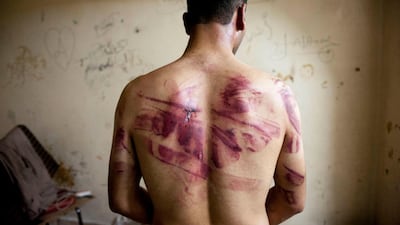The Holocaust Museum in Washington, DC, on Thursday joined civil advocacy group the Syrian Emergency Task Force for a panel reflecting on the Syrian war, as its 10th anniversary approaches.
Naomi Kikoler, director of the Holocaust Museum’s Simon-Skjodt Centre for the Prevention of Genocide, said its campaign against the violence in Syria is part of its "Never Again" mission.
“The reason we’ve been so involved and committed is because ... we have been watching crimes unfold before our eyes in vivid detail but have not seen action taken to protect lives,” Ms Kikoler said.
“We've seen the gap between the rhetoric and reality of ‘never again’, and I dare say the hypocrisy of that commitment statement rings so stark in the context of Syria.”
For Omar Alshogre, the task force's director of detainee issues and a survivor of Syrian President Bashar Al Assad's prisons, that connection is apparent.
"The similarity is uncanny … showing the world that what the American government had said they would never allow to happen is happening, telling them, 'You guys are lying to yourselves'," Mr Alshogre told The National.
“Being the leader of the democratic world is not just a title you have, it’s a responsibility.”
The online conference featured a range of speakers involved in the Syrian crisis and US policy towards it.
They included Frederic Hoff, former US envoy to Syria, and Qutaiba Idlibi, representative of the Syrian Opposition Coalition to the US.
The US assistant secretary of state for Near Eastern Affairs, Joey Hood, sent a statement.
The Syrian Emergency Task Force played an important role in passing the US Caesar Act, a series of sanctions against Damascus.
The legislation is named after a man known as Caesar, who documented torture against civilians by the Assad regime.
“Any legal prosecutions we’re going to start, we’re going to need those people to testify,” Mr Alshogre told the conference.
"And when we managed to protect ‘Caesar’, we inspired so many survivors to speak up.
"That's why we managed to have a prosecution in Germany [that] sentenced one war criminal to prison for four and a half years."
Demands for accountability represent another connection between this moment in Syria and the Holocaust in Europe for the Washington museum.
“Part of the mission of the museum is to do for communities today what was not done for Jews during the Holocaust,” Ms Kikoler said.
“That includes ensuring that individuals like [Mr Alshogre] and others are able to have a seat at the table to identify how justice can be pursued.”
Mr Alshogre said the issue was urgent.
“The war is very documented," he said. "There are a huge number of war criminals.
"We cannot wait until the regime falls to prosecute those criminals. We need to start now.
"Every survivor you lose, you’re losing evidence, you’re losing testimony, human rights prosecution possibilities. The next step [for the regime] will be killing the survivors.”
Ms Kikoler said there were glimmers of hope that war criminals would be brought to justice.
“We’re seeing growing momentum, not just from survivors, but from governments that are willing to extend the political will to hold Assad responsible," she said.
"The Assad regime, much like the former Nazis who tried to flee, are going to have to be looking over their shoulder every single day, wondering whether or not they will be picked up as they travel abroad.”
New numbers from the International Committee of the Red Cross show that almost half of Syrian youths have lost an immediate family member or close friend in this decade of violence.
Mr Alshogre said it was important that those statistics were understood in human terms.
“I lost so many loved ones," he said. "I want to use every single anniversary to remind the world of them.
"I don’t want my father, my brothers or my cousins who died with me in prison to be just like a few of a half million people who died in the war, so they are remembered as people, not as numbers.
“Those 10 years of pain are also 10 years of resilience.
"The Syrian people have shown the world how strong and willing they are to achieve freedom, their basic rights, despite all the brutality they face.
"And I’m proud of that. I’m proud of myself and my fellow Syrians.”


